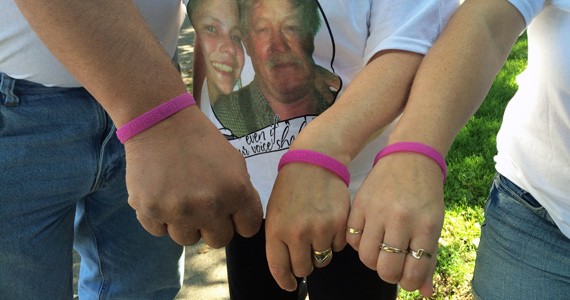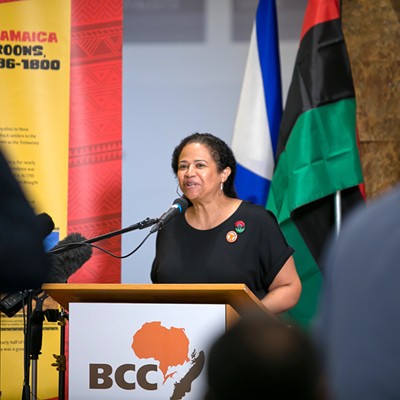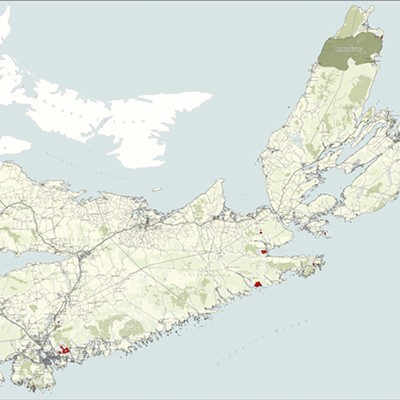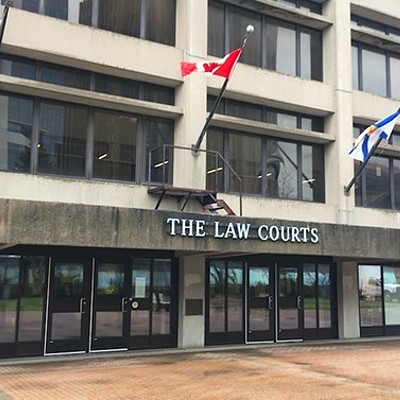James Saunders wears a shirt with a photo of his sister and their father as he hands out pink bracelets in her memory. The bracelets say "Loretta and the stolen sisters," and the shirt, one of more than a dozen worn by her family in court last week, reads: "Speak the truth, even if your voice shakes."
"She had a good head on her shoulders, had a lot going for her," James remembers outside Halifax provincial court as the inquiry into his sister's murder recessed. "It's too bad this had to happen to her. It's tearing everyone apart."
James says Loretta used to call their mom, Miriam, to talk about her studies on missing and murdered aboriginal women, "saying stuff like, 'Why? Why does this have to happen to all these women?'
She used to be really upset about it, he says. "She was my sister. She pretty much raised me."
"Took everything I had," he says with a higher pitch to his voice. "Took everything I had." He crouches down on the pavement, sobbing. Two women wearing identical shirts surround James and hug him.
As they comforted each other during the inquiry last week, it was clear Loretta Saunders' family members were still grieving the 26-year-old's death.
When Loretta went missing the day before Valentine's Day, her family flew from Newfoundland to Halifax to search for her, appealed for help from the public using social media, held a nationwide vigil and, with the aid of volunteers, plastered the city with posters.
In the late afternoon on February 26, her body was found on a snowy median off the Trans Canada Highway near Salisbury, New Brunswick. Her two roommates, Victoria Henneberry and Blake Leggette, were subsequently charged with her murder.
Last week her family again travelled to Halifax to hear evidence against the two accused. On August 1, justice Anne Derrick is expected to rule whether the case will go to trial.
The evidence was hard to hear–under publication ban–family members told media throughout the inquiry. On July 23 after the judge called a recess, Loretta's uncle stood up and made a move toward the two defendants. His family members quickly restrained him. Before he was removed from the courtroom, a woman wearing a pink bracelet and a t-shirt with the victim's face on it told him, "Don't let them win, don't do that. We're here for Loretta!"
The inquiry was made harder still by the fact Loretta's mother and two siblings were initially subpoenaed as witnesses, which meant they could not attend court or exchange details with family who attended the proceedings.
"It's pretty difficult being kept out of the process and being kept from details," Loretta's sister Delilah told media July 25. "It's been really, really difficult on the entire family.
"It was just really difficult not being able to talk about it, and waiting out here for my brother and seeing him come out crying," she added.
"We weren't allowed to tell them anything," James echoed.
On July 25, justice Derrick decided the family members who were previously barred from court could attend, since they are no longer witnesses in the inquiry.
Saint Mary's University faculty member Darryl Leroux was initially called as a witness along with family members, but was told his testimony was no longer required.
The first time he met Loretta was during a guest lecture he gave to her class. She was sitting at the front of the class, he remembers as he stands outside the courthouse.
"There were I think three students who asked me some questions, and I think Loretta asked me three or four," the assistant professor says, laughing gently at the memory. "They weren't easy questions. They were more like, you have to stop and think."
Last September, his student, Loretta, who was already interested in crime, justice and aboriginal peoples, seized onto the topic of missing and murdered aboriginal women.
Since 1980, almost 1,200 aboriginal women have been murdered or gone missing in Canada. Aboriginal women in Canada made up 4.3 per cent of the female population in 2013, however they represented 16 percent of murdered women and 11.3 percent of all missing women on record.
"She herself had known women who had gone missing and who had been murdered," Leroux says of Loretta.
It can be tough to get students to narrow their ideas to a particular item instead of one that will take the rest of their life, Leroux explains. "She had one of those rest-of-your-life ideas."
Over time her thesis topic became more specific. She was a determined researcher, her professor recalls. "Some people when they can't find something, they'll give up, or they'll try two or three times, but she would just not give up."
Her thesis proposal was 28 pages. In an email to her on February 1 he called her proposal "a thing of beauty."
"Our world needs more people like you Loretta; please keep reading and writing about whatever you're most passionate about. I will do everything I can to support your efforts to become the intellectual and community leader you are meant to be," he wrote.
Loretta would likely have graduated in May, Leroux says. She was considering law school after graduation.
On Monday, Loretta's mother Miriam Saunders posted about the inquiry on a Facebook group dedicated to her memory: "Hard as it was, it is so good to know things about my princess. We didn't get the whole details but we did get an idea in the court on the last day. We can now deal with things. It was hard not knowing. The thoughts in our heads were horrible. As bad as things were, now we can start to heal as a family."
















